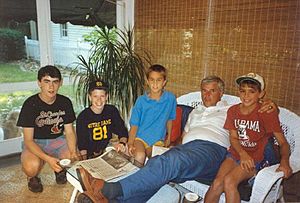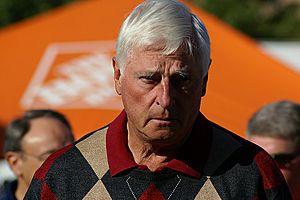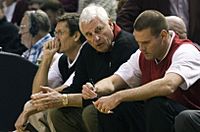Bob Knight facts for kids
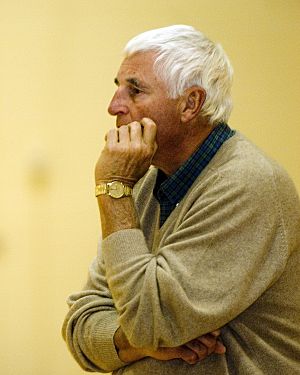
Knight watches Texas Tech practice in 2007
|
||||||||||||||||||||
| Biographical details | ||||||||||||||||||||
|---|---|---|---|---|---|---|---|---|---|---|---|---|---|---|---|---|---|---|---|---|
| Born | October 25, 1940 Massillon, Ohio, U.S. |
|||||||||||||||||||
| Died | November 1, 2023 (aged 83) Bloomington, Indiana, U.S. |
|||||||||||||||||||
| Playing career | ||||||||||||||||||||
| 1959–1962 | Ohio State | |||||||||||||||||||
| Position(s) | Forward | |||||||||||||||||||
| Coaching career (HC unless noted) | ||||||||||||||||||||
| 1962–1963 | Cuyahoga Falls HS (assistant) | |||||||||||||||||||
| 1963–1965 | Army (assistant) | |||||||||||||||||||
| 1965–1971 | Army | |||||||||||||||||||
| 1971–2000 | Indiana | |||||||||||||||||||
| 2001–2008 | Texas Tech | |||||||||||||||||||
| Head coaching record | ||||||||||||||||||||
| Overall | 902–371 (.709) | |||||||||||||||||||
| Accomplishments and honors | ||||||||||||||||||||
| Championships | ||||||||||||||||||||
As player:
|
||||||||||||||||||||
| Awards | ||||||||||||||||||||
|
||||||||||||||||||||
| Basketball Hall of Fame Inducted in 1991 |
||||||||||||||||||||
| College Basketball Hall of Fame Inducted in 2006 |
||||||||||||||||||||
|
Medal record
|
||||||||||||||||||||
Robert Montgomery Knight (October 25, 1940 – November 1, 2023) was a famous American college basketball coach. Many people called him Bobby Knight or "the General" because of his strong leadership. He won 902 games in NCAA Division I men's basketball. This was a record when he retired.
Knight was the head coach for the Indiana Hoosiers from 1971 to 2000. He also coached the Texas Tech Red Raiders (2001–2008) and Army Black Knights (1965–1971). He was added to the Naismith Memorial Basketball Hall of Fame in 1991.
While coaching at Army, Knight led his teams to four post-season tournaments. He won about two-thirds of his games there. At Indiana, his teams won three NCAA championships. They also won one National Invitation Tournament (NIT) and 11 Big Ten Conference championships. His 1975–76 team won the 1976 NCAA tournament. They are the last men's team in Division I college basketball to have an undefeated season (32-0).
Knight was known for his strong personality and sometimes his temper. He once threw a chair across the court during a game. He also had arguments with reporters. After an incident at Indiana, the university set a "zero tolerance" rule for him. He was later fired in 2000. He then coached at Texas Tech from 2001 to 2008. His teams there made it to post-season tournaments five times. Knight retired in 2008 and his son, Pat Knight, took over. Many of his former players and fans still admire him greatly.
Knight also had success in international basketball. In 1984, he coached the U.S. men's Olympic team to a gold medal. He is one of only three coaches to win an NCAA title, an NIT title, and an Olympic gold medal. After coaching, Knight worked as a college basketball analyst for ESPN.
Knight was a very successful and creative coach. He helped make the motion offense popular. He won national coach of the year honors four times. He also won Big Ten Coach of the Year honors eight times.
Contents
Early Life and College Years
Bob Knight was born on October 25, 1940, in Massillon, Ohio. He grew up in Orrville, Ohio. His father worked for the railroad, and his mother was a teacher. He started playing basketball at Orrville High School.
Knight went on to play at Ohio State in 1958. He played for Basketball Hall of Fame coach Fred Taylor. Even though he was a star in high school, he was a reserve player at Ohio State. He was on the 1960 Ohio State Buckeyes team that won the NCAA championship. This team had future Hall of Fame players like John Havlicek and Jerry Lucas. Knight was also on the Ohio State teams that lost in the finals in 1961 and 1962.
Knight didn't play much because of the many talented players on his team. He graduated in 1962 with a degree in history and government. After college, he coached junior varsity basketball for one year. Then, he joined the U.S. Army in 1963.
Coaching Career
Army Black Knights
While in the Army, Knight became an assistant coach for the Army Black Knights in 1963. Two years later, at just 24 years old, he became the head coach. In six seasons at Army, Knight won 102 games. He led Army to four NITs, reaching the semifinals three times. One of his players was Mike Krzyzewski, who later became a famous coach at Duke.
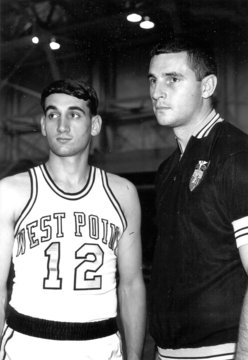
During his time at Army, Knight started to gain a reputation for his strong emotions during games. After a tough loss in the 1966 NIT semifinals, Knight was very upset. He later apologized to the opposing coach. That coach told him he would become one of the best young coaches and would win a national championship.
Indiana Hoosiers
In 1971, Indiana University Bloomington hired Knight as their head coach. He coached the Hoosiers for 29 years. During this time, they won 662 games and had 22 seasons with 20 or more wins. His teams won three NCAA titles in 1976, 1981, and 1987. They also reached the Final Four in 1973 and 1992.
A Decade of Dominance: The 1970s
In his second year, 1972–73, Indiana won the Big Ten championship. They reached the Final Four but lost to UCLA. The next season, 1973–74, they won another Big Ten title. In the 1974–75 and 1975–76 seasons, the Hoosiers had perfect regular seasons. They won 37 Big Ten games in a row and two more Big Ten championships.
The 1974–75 team was very strong, winning Big Ten games by a large margin. However, their star player, Scott May, broke his arm. This injury affected the team, and they lost in the NCAA tournament. The next season, the 1975–76 Hoosiers went undefeated for the entire season and the 1976 NCAA tournament. They beat Michigan 86–68 in the championship game. This 1976 team is still the last undefeated NCAA Division I men's basketball team. In 1979, Indiana won the NIT championship.
National Titles in the 1980s
The 1979–80 Hoosiers, led by Mike Woodson and Isiah Thomas, won the Big Ten championship. The next season, 1980–81, Thomas and the Hoosiers won another conference title and the 1981 NCAA tournament. This was Knight's second national title. In 1982–83, the top-ranked Hoosiers were expected to win another championship. But an injury to star player Ted Kitchel hurt their chances. They still won the Big Ten title, and Knight thanked the fans for their support.
In 1986, a book called A Season on the Brink was written about the Hoosiers. Knight gave the author, John Feinstein, special access to the team. The next season, 1986–87, the Hoosiers won Knight's third national championship. They beat Syracuse in the 1987 NCAA tournament with a game-winning shot by Keith Smart. In 1988–89, the Hoosiers won another Big Ten championship.
Challenges and Changes: 1990–2000
From 1990–91 to 1992–93, the Hoosiers won 87 games, which was a record for any Big Ten team in three years. They won two Big Ten titles in 1990–91 and 1992–93. In the 1991–92 season, they reached the Final Four. The 1992–93 team finished the season ranked number one. Key players from this time included Damon Bailey and Calbert Cheaney.
Throughout the mid and late 1990s, Knight's teams continued to make NCAA tournament appearances. However, 1993 was his last conference championship, and 1994 was his last trip to the Sweet Sixteen.
Knight was involved in several notable incidents during the 1990s. He was known for his intense coaching style. In 1992, he used a bullwhip playfully during practice, which caused some controversy. In 1993, he created a fake player named Ivan Renko to show how some recruiting services were not honest.
Dismissal from Indiana
In March 2000, a report claimed that Knight had physically confronted a former player during practice in 1997. A video later appeared to show this incident. Because of this, Indiana University president Myles Brand announced a "zero tolerance" policy for Knight's behavior.
Later that year, in September 2000, a student reportedly spoke to Knight in a way he found disrespectful. Knight then lectured the student about showing respect. President Brand said this was one of many complaints after the new policy. Brand asked Knight to resign, and when he refused, Knight was fired. Many students were very upset by this decision. Knight said goodbye to his supporters and asked them to continue supporting the team.
Knight eventually returned to Assembly Hall, Indiana's basketball arena, in February 2020. He received a huge welcome from the fans. This was his first time at an Indiana game since he was fired 20 years earlier.
Texas Tech Red Raiders
After leaving Indiana, Knight took a year off. He then became the head coach at Texas Tech University. He quickly improved the Red Raiders program. They had not been to an NCAA tournament since 1996. Knight led them to post-season tournaments in each of his first four years. Their best performance under Knight was in 2005, when they reached the Sweet Sixteen.
Knight won his 900th game on January 16, 2008, in a win against Texas A&M. On February 4, 2008, Knight announced his retirement. His son, Pat Knight, who was set to take over, immediately became the new head coach. Knight continued to live in Lubbock, Texas, after he retired.
International Coaching
In the 1979 Pan American Games, Knight led the United States team to a gold medal. In the 1984 Summer Olympic Games, he coached the U.S. national team to a gold medal. Players on that team included Michael Jordan and Knight's former Indiana player, Steve Alford. Knight is one of only three coaches to win an NCAA title, an NIT title, and an Olympic gold medal.
Life After Coaching
In 2008, ESPN hired Knight as a studio analyst for college basketball. In November 2012, he called an Indiana men's basketball game for the first time. This was something he had not wanted to do before. ESPN did not renew his contract in 2015.
In 2019, it was reported that Knight was having health issues. He made a public appearance where he seemed to struggle with his memory. Later that year, news came out that Knight and his wife had bought a home in Bloomington, Indiana, suggesting he had moved back.
Coaching Style
Knight was known for developing and popularizing the motion offense. This system focuses on players setting screens and passing the ball until someone is open for a shot. It required players to be unselfish and disciplined.
Knight was also famous for how much he prepared for every game and practice. He often said, "Most people have the will to win, few have the will to prepare to win." His offense was designed to react to the defense, rather than using fixed plays.
The three-point shot was added to college basketball in 1986. Even though Knight didn't like the rule, it worked well with his offense. His offense also emphasized a "two-count," meaning players would hold the ball or a screen for two seconds to make decisions.
On defense, Knight taught a tough "man-to-man" defense. This meant defenders would challenge every pass and shot. He also sometimes used a zone defense.
Knight also strongly believed in academics. Almost all of his four-year players earned their college degrees. This was much higher than the national average for college basketball players.
Legacy
Accomplishments
Bob Knight's total coaching record was 902 wins and 371 losses. His 902 wins in NCAA Division I men's college basketball games is one of the highest totals ever. He held the record for most career victories until his former player, Mike Krzyzewski, passed him in 2011.
Knight is the youngest coach to reach 200, 300, and 400 wins. He also made more NCAA tournament appearances than any other coach. He is the only coach to win the NCAA title, the NIT title, an Olympic Gold medal, and a Pan American Games Gold medal.
Recognition
Knight received many awards during and after his career. He was named National Coach of the Year four times (1975, 1976, 1987, 1989). He was also named Big Ten Coach of the Year eight times. In 1987, he was the first person to receive the Naismith Coach of the Year Award. Knight was inducted into the Basketball Hall of Fame in 1991.
He was also inducted into the National Collegiate Basketball Hall of Fame in 2006. The next year, he received the Naismith Award for Men's Outstanding Contribution to Basketball. Knight was also honored by the Army Sports Hall of Fame and the Indiana Hoosiers athletics Hall of Fame.
Coaching Tree
Many of Knight's assistant coaches, players, and managers went on to become coaches themselves. This includes famous coaches like Mike Krzyzewski, Steve Alford, Mike Woodson, and Isiah Thomas.
In the Media
Books About Knight
In 1986, John Feinstein wrote A Season on the Brink. This book followed the 1985–86 Indiana Hoosiers season. It showed Knight's strong temper but also that he followed all NCAA rules. The book became very popular.
Knight's autobiography, Knight: My Story, was published in 2003. In 2013, he and Bob Hammel published The Power of Negative Thinking. In this book, Knight shared his ideas about preparing for games by thinking about what could go wrong.
Film and Television
Knight appeared in or was featured in many films and TV shows. In the 1994 movie Blue Chips, a character based on Knight was played by Nick Nolte. Knight himself even appeared in the movie.
ESPN made a TV movie called A Season on the Brink in 2002, based on the book. ESPN also had a reality show called Knight School. This show followed students trying to earn a spot on the Texas Tech basketball team.
Knight also made a cameo appearance as himself in the 2003 film Anger Management. He appeared in commercials for Volkswagen and Guitar Hero: Metallica.
Personal Life and Death
Knight married Nancy Falk in 1963, and they had two sons, Tim and Pat. They divorced in 1985. Pat played for Indiana and later became a coach. In 1988, Knight married Karen Vieth Edgar.
Knight cared a lot about education. He gave generous donations to libraries at the schools he was part of. He helped raise almost $5 million for the Indiana University library system. He also donated to the Texas Tech library.
Knight supported Donald Trump's 2016 presidential campaign. He appeared at a rally for Trump in 2018.
Bob Knight passed away in Bloomington, Indiana, on November 1, 2023, at the age of 83.
Images for kids
-
Mike Krzyzewski and Knight during his tenure at Army
-
Knight with young fans at Frank Truitt's house in Columbus, summer of 1988
See also
 In Spanish: Bobby Knight para niños
In Spanish: Bobby Knight para niños
- List of college men's basketball coaches with 600 wins
- List of NCAA Division I Men's Final Four appearances by coach


